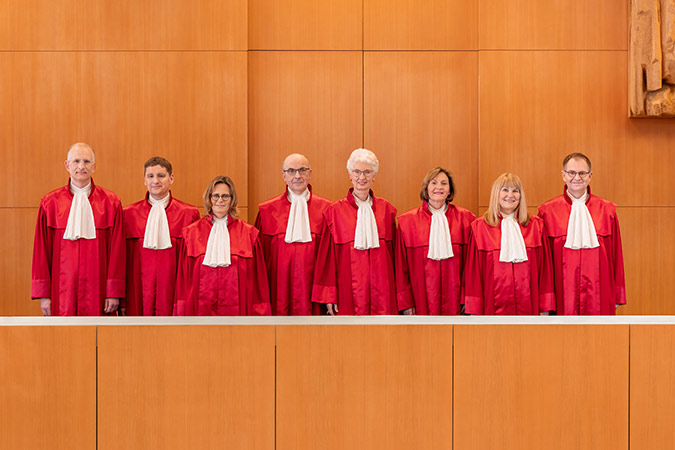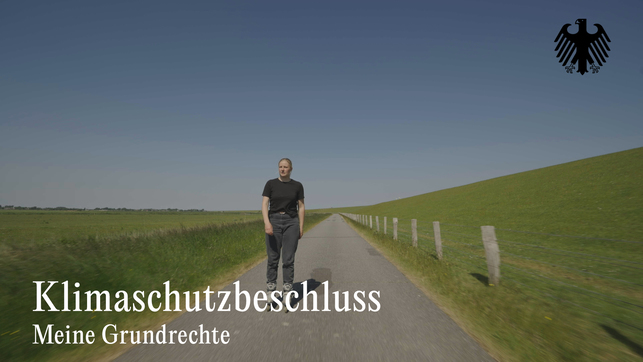
The
Federal Constitutional Court
A court and constitutional body

The Federal Constitutional Court has its seat in Karlsruhe. It is both a court and a constitutional body. It consists of two senates, each of which has eight justices. The senates are chaired by the president or the vice-president. The First Senate is responsible in particular for constitutional complaints by citizens who feel that their fundamental rights have been violated. The jurisdiction of the Second Senate includes, among other things, disputes in the area of state organisation law, such as disputes over competences between the Federation and the Länder or between the constitutional organs themselves.
As a constitutional body, the Federal Constitutional Court – unlike the specialised courts – is not subject to the supervision of a ministry and can decide itself on matters of its administration and organisation.
Every year, many new cases are received by the Federal Constitutional Court, including about 5,000 constitutional complaints. In order to be able to cope with this high number of submissions, chambers with three members each are formed by both senates. They mainly decide on cases that are not of fundamental constitutional importance, which is roughly 99% of the proceedings.
Each of the 16 justices is assisted by four judicial clerks who have gained relevant professional experience at ordinary courts, public authorities, law firms or universities. The heavy caseload of the Federal Constitutional Court would not be manageable without the judicial officers, the secretarial and antechamber staff and the registry, the members of the general administration, the library and the IT department. In total, about 290 people work at the Federal Constitutional Court to ensure that it can perform its duties.







„Dear Citizens,
It is our pleasure to join you in celebrating German Unity Day 2024 in Schwerin!
The year 2024 marks the 75th anniversary of Germany’s Basic Law. In the history of our country, our Basic Law has been incredibly beneficial. It gives us a stable regulatory framework and forms the basis for our free, democratic and pluralistic society. In addition to this, the Basic Law has proved that it is a constitution which is open to the future. After the fall of the Berlin Wall 35 years ago, it facilitated and guided the reunification of Germany and the gradual joining of east and west. During this eventful period, the people successfully revolted and brought change to the former GDR, and in doing so had made a strong commitment to fundamental rights, democracy and the rule of law. Today, the Basic Law guarantees these values for all citizens in the Federal Republic of Germany. It is the task of the Federal Constitutional Court to uphold them – and it is our common duty to continue to stand up for the values of the Basic Law, now and in the future.
We are pleased to give you an insight into the Federal Constitutional Court and its work, and cordially invite you to visit our pavilion at the Festival of Unity in Schwerin. “
Prof. Dr. Stephan Harbarth, President of the Federal Constitutional Court
Duties
The Federal Constitutional Court is responsible for ensuring adherence to the Basic Law in the Federal Republic of Germany. Since its establishment in 1951, the Court has helped ensure respect for and give effect to Germany’s free democratic basic order. This applies in particular to the enforcement of fundamental rights. All bodies exercising public authority are obliged to observe the Basic Law. In the event of disputes regarding the Basic Law, proceedings may be brought before the Federal Constitutional Court. Its decisions are final and binding on all other state organs.
The work of the Federal Constitutional Court also has political effects. This becomes particularly clear when the Court declares legislation unconstitutional. However, the Court is not a political body. Its sole standard of review is the Basic Law. The Court must not take into consideration questions of political expediency in its decisions. It only determines the constitutional framework within which policies may develop.
FILM SERIES “MY CONSTITUTIONAL RIGHTS”
The film series My Constitutional Rights focuses on important decisions made by the Federal Constitutional Court and their impact on social and political life.
The Federal Constitutional Court at the Festival
In the pavilion of the Federal Constitutional Court at the Festival of Unity in Schwerin between the 2nd and 4th of October 2024, court staff will be answering questions about their work. Films and video statements by the judges will provide insight into the court’s work.
Further information
More information about the Federal Constitutional Court and its duties can be found in our Annual Report and on our website.

